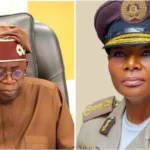The Nigerian Midstream and Downstream Petroleum Regulatory Authority (NMDPRA) has announced that the Dangote refinery is not yet licensed to operate.

NMDPRA CEO, Farouk Ahmed clarified this on Thursday while speaking to journalists in Abuja.
He denied claims that the regulatory body was trying to block the refinery’s operations due to a lack of crude oil supply from international companies.
Ahmed explained that the refinery is still in the pre-commissioning stage and has not received a license yet.
“There are lots of concerns about the supply of petroleum products nationwide and the claims by some media houses that we were trying to scuttle Dangote refinery, that is not so.
“Dangote Refinery is still in the pre-commissioning stage. It has not been licensed yet. We have not licensed them yet,” he said.
Ahmed also criticized Dangote’s request to stop all fuel imports and direct marketers exclusively to their refinery, arguing that this could create a market monopoly and threaten national energy security.
He noted that the refinery is about 45% complete, so relying solely on it for the nation’s fuel supply is not feasible at this time.
“I think they are at about 45 per cent completion. So we cannot rely heavily on one refinery to feed the nation because Dangote is requesting that we should suspend or stop all importation of petroleum products, especially automotive gas oil (AGO) or jet kero and direct all marketers to the refinery,” he said.
The NMDPRA CEO also raised concerns about the quality of the petroleum products from the Dangote refinery, stating that they are of lower quality compared to imported products.
Ahmed explained that the sulfur levels in Dangote’s products exceed West African standards.
He added, “So, in terms of quality, currently, the AGO quality in terms of sulfur is the lowest as far as a West African requirement of 50 ppm.
“Dangote Refinery, as well as some major refineries, like Walter Smith’s refinery, other refineries, they produce 650 to 1,200 ppm. So, in terms of quality, their quality is much, much inferior to the imported commodities.”
Dangote Industries Vice-President Devakumar Edwin accused international oil companies (IOCs) of making it difficult for the company to access local crude oil, forcing them to use expensive middlemen and pay higher prices.
Edwin claimed that IOCs have consistently hindered access to local crude and charged $2-$4 more per barrel than the official price.
KanyiDaily recalls that Aliko Dangote recently said that no economic growth will happen under President Bola Tinubu unless the current 30% bank interest rate is reduced.


![Uriel Oputa Reveals Burna Boy Is Her Celebrity Crush, Shares Sexual Fantasies [Video] 2 Uriel Uputa Reveals Burna Boy Is Her Celebrity Crush, Shares Sexual Fantasies [Video]](https://media.kanyidaily.com/2024/07/19151410/Uriel-Oputa-Burna-Boy-150x150.jpg)
![BLord Declares Himself Youth President, Meets Obi Cubana After Police Release [Video] 3 BLord Declares Himself Youth President, Meets Obi Cubana After Police Release [Video]](https://media.kanyidaily.com/2024/07/19180526/BLord-Obi-Cubana-150x150.jpg)




![Kanye West Reveals He Never Wanted Kids With Kim Kardashian [Video] 13 Kanye West Reveals He Never Wanted Kids With Kim Kardashian [Video]](https://media.kanyidaily.com/2025/03/31133648/Kanye-West-Kim-Kardashian-150x150.jpg)

![Annie Macaulay Makes First Public Appearance After Divorce From 2Baba Idibia [Video] 17 Annie Macaulay Makes First Public Appearance After Divorce From 2Baba Idibia [Video]](https://media.kanyidaily.com/2025/03/31121612/Annie-Idibia-Macaulay-150x150.jpg)

![Erykah Badu Mocks BBL Ladies With Her Outfit At Billboard "Women In Music Awards" [Video] 21 Erykah Badu Mocks BBL Ladies With Her Outfit At Billboard "Women In Music Awards" [Video]](https://media.kanyidaily.com/2025/03/31093313/Erykah-Badu-150x150.webp)


